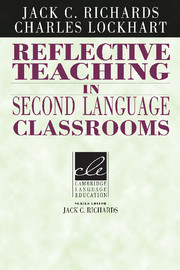Book contents
- Frontmatter
- Contents
- Series editor's preface
- Preface
- Introduction: Teacher development through exploring classroom processes
- 1 Approaches to classroom investigation in teaching
- 2 Exploring teachers' beliefs
- 3 Focus on the learner
- 4 Teacher decision making
- 5 The role of the teacher
- 6 The structure of a language lesson
- 7 Interaction in the second language classroom
- 8 The nature of language learning activities
- 9 Language use in the classroom
- Epilogue
- References
- Index
1 - Approaches to classroom investigation in teaching
Published online by Cambridge University Press: 29 January 2010
- Frontmatter
- Contents
- Series editor's preface
- Preface
- Introduction: Teacher development through exploring classroom processes
- 1 Approaches to classroom investigation in teaching
- 2 Exploring teachers' beliefs
- 3 Focus on the learner
- 4 Teacher decision making
- 5 The role of the teacher
- 6 The structure of a language lesson
- 7 Interaction in the second language classroom
- 8 The nature of language learning activities
- 9 Language use in the classroom
- Epilogue
- References
- Index
Summary
The assumption underlying this book is that in every lesson and in every classroom, events occur which the teacher can use to develop a deeper understanding of teaching. Teachers sometimes fail to exploit these events, letting momentum of all the other events of the day take precedence.And yet these experiences can serve as the basis for criticalreflection, if teachers can find ways to capture the thoughts of andreactions to these events, as well as ways to gather fuller informationabout the events themselves. From this basis, teachers can develop strategies for intervention or change, depending on their needs. In this chapter, a number of simple procedures are introduced that can be used to help teachers investigate classroom teaching. Each procedure has advantages and limitations, and some are more useful for exploring certain aspects of teaching than others. The reader will have to decide which procedures are useful and for what purposes.
The procedures discussed here will be referred to throughout the book and consist of:
Teaching journals. Written or recorded accounts of teaching experiences.
Lesson reports. Written accounts of lessons which describe the main features of the lessons.
Surveys and questionnaires. Activities such as administering a questionnaire or completing a survey, designed to collect information on a particular aspect of teaching or learning.
Audio and video recordings. Recordings of a lesson, or part of a lesson.
Observation. Tasks completed by a student teacher observing a cooperating teacher's class, or peer observation (i.e., tasks completed by a teacher visiting a colleague's class).
[…]
Information
- Type
- Chapter
- Information
- Reflective Teaching in Second Language Classrooms , pp. 6 - 28Publisher: Cambridge University PressPrint publication year: 1994
